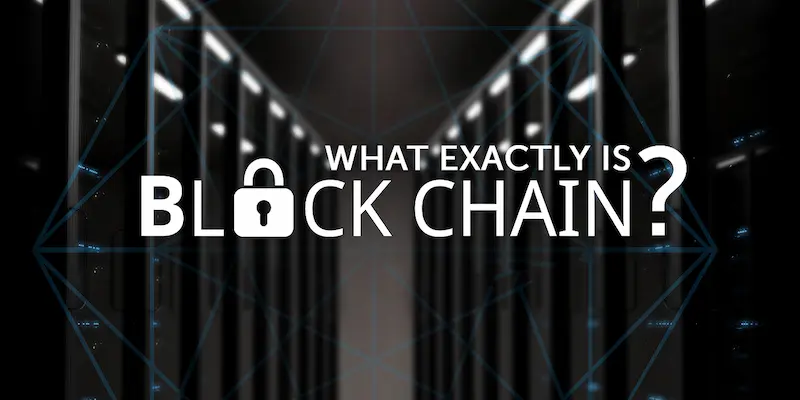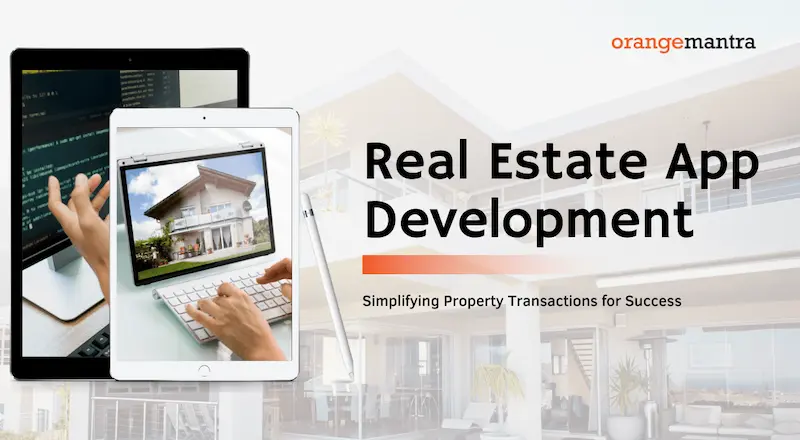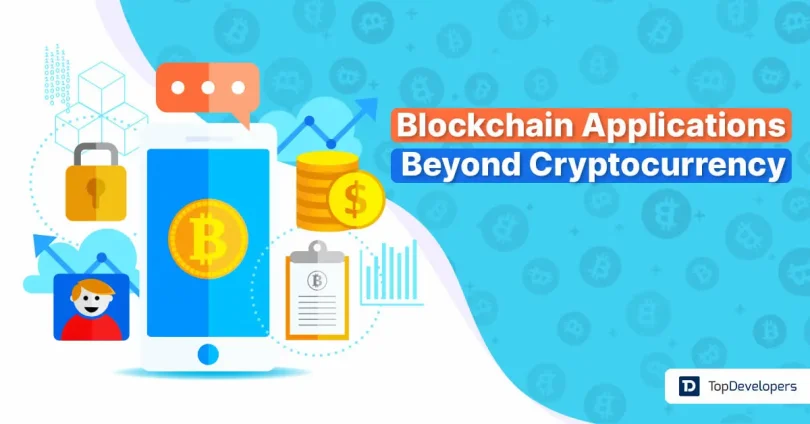When you hear the word blockchain, most people immediately think of Bitcoin, Ethereum, or other cryptocurrencies. That’s not surprising—crypto was the first major application of blockchain that made headlines. But here’s the exciting part: blockchain is much more than just digital money.
From tracking fair-trade coffee beans to securely managing patient records, blockchain is transforming industries in ways you might not expect. In fact, in this guide, we’ll focus on blockchain applications beyond cryptocurrency, showing how this powerful technology is making a real difference in healthcare, real estate, supply chains, voting systems, and more.
By the end, you’ll see that blockchain applications beyond cryptocurrency aren’t just a concept—they’re practical tools for building trust, transparency, and efficiency across the world.
What Exactly is Blockchain?

Think of blockchain as a digital ledger or notebook that records transactions. The special part?
- It’s decentralized: Instead of being stored on one computer or server, copies of the blockchain exist on thousands of computers worldwide.
- It’s transparent: Everyone on the network can see the records.
- It’s secure: Once something is recorded, it’s nearly impossible to alter without consensus.
Each piece of information is stored in a block, and these blocks are linked together in chronological order to form a chain—hence the name “blockchain.”
This combination of transparency, security, and decentralization makes blockchain useful for far more than just transferring digital money.
You may also like to read this:
Best Upcoming AI Tools For Productivity In 2025 Guide
Top 15 Latest Green Technology Innovations To Watch Now
Future Applications of Quantum Computing Explained Guide
How The Impact of 5G on Gadgets Is Changing Technology
Blockchain Applications Beyond Cryptocurrency: Examples & Uses
Now, let’s look at some real-world applications where blockchain is already making waves beyond the world of crypto coins.
1. Supply Chain Management: Tracking Goods from Farm to Store
Have you ever questioned if your coffee is truly “fair trade” or if your branded sneakers are authentic? Blockchain is transforming supply chains by tracking every step of a product’s journey.
- Companies like Walmart are already using blockchain to trace food from farm to shelf.
- This means if there’s an issue—say a contamination scare—the source can be identified instantly.
- It reduces fraud, increases trust, and helps businesses and customers know exactly where products come from.
Use case: Ensuring food safety, authentic luxury goods, and ethical sourcing.
2. Healthcare: Secure & Unified Medical Records
Healthcare is notorious for having fragmented patient records scattered across multiple hospitals, labs, and clinics. Blockchain solves this by storing medical information in a secure, unified system that patients control.
- Patients can give doctors permission to access their records instantly.
- Sensitive data remains private, protected by blockchain encryption.
- Emergency care becomes easier since doctors can quickly access accurate history.
Use case: Streamlined medical records, reduced errors, and improved patient privacy.
3. Voting Systems: Secure & Transparent Elections
One of the biggest concerns during elections is fraud and manipulation. Blockchain can make voting more secure and trustworthy by:
- Recording each vote as a block in the chain.
- Making results transparent and tamper-proof.
- Allowing remote digital voting without risking integrity.
Countries like Estonia have already experimented with blockchain-based voting.
Use case: Transparent, fraud-resistant elections.
4. Real Estate: Simplifying Property Transactions

Buying or selling property often means dealing with piles of paperwork, middlemen, and high fees. Blockchain introduces smart contracts—self-executing agreements coded into the blockchain.
- Property ownership records can be stored on blockchain.
- Transactions become faster and less costly.
- Fraud risks are reduced since ownership history is traceable and transparent.
Use case: Faster, safer, and more efficient real estate deals.
5. Digital Identity: You Own Your Data
Tired of managing dozens of passwords and personal details online? Blockchain enables self-sovereign identity (SSI)—meaning you control your own digital identity instead of big corporations.
- You decide which pieces of information to share and with whom.
- No central database can be hacked to steal your identity.
- It makes online logins and verifications much safer.
Use case: Safer online authentication, reduced identity theft.
6. Intellectual Property & Copyright Protection
Artists, musicians, and writers often struggle to prove ownership of their creations and to get paid fairly. Blockchain offers a solution:
- Creators can register their work on blockchain, proving it’s theirs.
- Smart contracts ensure they’re automatically paid when their content is used.
- This reduces piracy and gives creators more control.
Use case: Protecting creative work and ensuring fair payments.
7. Energy Trading: Powering a Peer-to-Peer Market
Imagine generating solar energy on your rooftop and selling the extra power directly to your neighbor—without going through a utility company. Blockchain makes this possible.
- Communities can set up peer-to-peer energy trading platforms.
- It encourages renewable energy adoption.
- Blockchain keeps transactions transparent and fair.
Use case: Decentralized, eco-friendly energy sharing.
8. Charity & Donations: Transparent Giving
One common concern with charities is whether donations truly reach the people in need. Blockchain builds trust by:
- Recording every donation and how it’s spent.
- Making the process transparent to donors.
- Reducing the chance of corruption and misuse.
Use case: Transparent, traceable charitable donations.
Why Blockchain Beyond Cryptocurrency Matters
The beauty of blockchain isn’t just about creating money without banks—it’s about creating trust without middlemen. By providing security, transparency, and decentralization, blockchain can reduce fraud, cut costs, and improve efficiency across countless industries.
From improving food safety to enabling transparent elections, blockchain applications are proving that this technology is a powerful tool with limitless potential.
Final Thoughts
Next time someone mentions blockchain, don’t just think Bitcoin or Ethereum. Think bigger—think about blockchain applications beyond cryptocurrency that are transforming industries like healthcare, real estate, supply chain management, and more.
Blockchain is more than a buzzword—it’s a foundation for the future of trust and transparency in our digital world.
FAQs
1. What are blockchain applications beyond cryptocurrency?
Blockchain applications beyond cryptocurrency include uses in supply chain management, healthcare, voting systems, real estate, digital identity, intellectual property, energy trading, and charity donations. These industries benefit from blockchain’s transparency, security, and decentralization.
2. How is blockchain used in healthcare?
Blockchain is used in healthcare to create secure and unified patient records. Instead of being spread across different hospitals, a patient’s history can be stored on blockchain, ensuring accurate, accessible, and private medical data. This reduces errors, speeds up treatment, and enhances patient control over their information.
3. Can blockchain be used outside of finance?
Absolutely! While finance was the first big use case, blockchain now powers solutions in logistics, elections, real estate, renewable energy, and even creative industries. Its ability to create trust without middlemen makes it valuable across multiple sectors.
4. What are smart contracts in blockchain?
Smart contracts are self-executing agreements stored on blockchain. They automatically carry out transactions when certain conditions are met, without the need for lawyers, brokers, or banks. For example, in real estate, smart contracts can transfer ownership once payment is verified.
5. Why is blockchain considered secure?
Blockchain is secure because:
Data is stored across many computers, not just one.
Each block is linked to the previous one, making tampering almost impossible.
Transactions are verified by consensus, so no single person controls the system.






